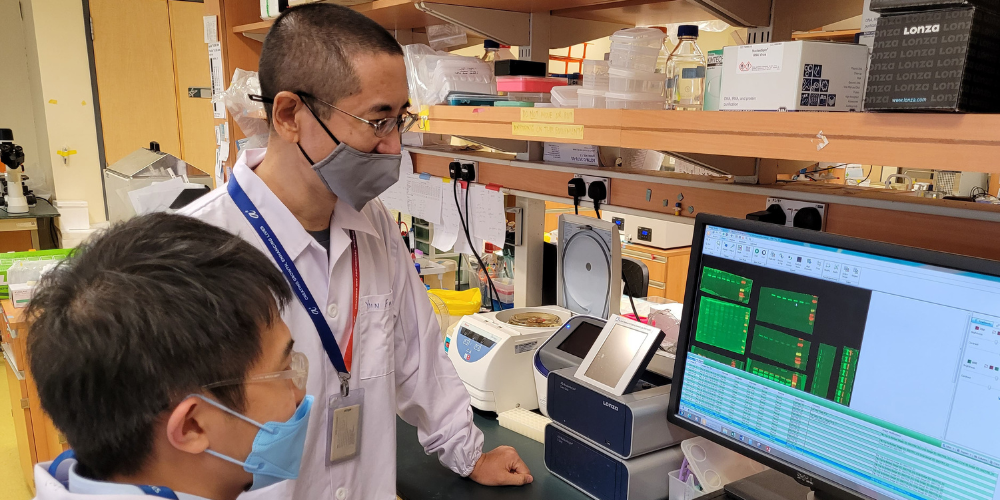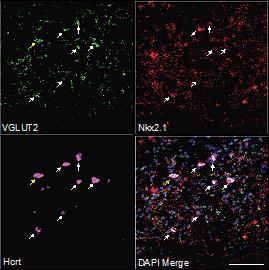A*STAR NEWS
Finding The Cure For Common Metabolic Diseases In Singapore
- A*STAR’s IMCB Research Director Professor Han Weiping’s work focuses on understanding how the brain interacts with the organ systems to influence physical and mental health.
- He investigates how metabolic regulators and metabolic states affect the brain and nervous system. Some of the genes being studied have been linked to neurological diseases like autism spectrum disorders and schizophrenia, and his work may offer targetable approaches in the treatment of these diseases.
 Professor Han Weiping, Research Director and Head of the Laboratory of Metabolic Medicine at A*STAR’s Institute of Molecular and Cell Biology (standing) with a team member studying metabolic targets in liver cancer.
Professor Han Weiping, Research Director and Head of the Laboratory of Metabolic Medicine at A*STAR’s Institute of Molecular and Cell Biology (standing) with a team member studying metabolic targets in liver cancer.
Professor Han Weiping fondly recalls his high school biology teacher, who played a crucial role nurturing his interest in life sciences. He was fascinated by how the body can function at its optimal level by adapting to environmental challenges. As a young student, he was told that life sciences would be the fastest growing subject in the 21st century, as such, he decided on biology as his major for his college entrance application. Over the years, his interest and fascination in the subject grew stronger and that has now become his passion and career.
Today, Prof Han is a Research Director and Head of the Laboratory of Metabolic Medicine at A*STAR’s Institute of Molecular and Cell Biology (IMCB). His research focuses on understanding the maintenance of a stable metabolic environment within our body, through interactions between our brain and peripheral organs. Through studying the essential role of metabolic states in maintaining cell survival and function, he investigates how disruptions in metabolic activities can lead to the development of metabolic diseases and associated complications.
Discovering therapeutic targets for cancer and diabetes
 The team uses FISH (fluorescence in situ hybridization) to validate co-expression of neuronal markers and subtypes in the brain. The different colours represent expression of different genes in the brain.
The team uses FISH (fluorescence in situ hybridization) to validate co-expression of neuronal markers and subtypes in the brain. The different colours represent expression of different genes in the brain. One of the major projects he is currently working on is the study of metabolic targets in liver cancer, which is the third biggest cause of cancer death in men, and the fourth in women in Singapore1 . He and his team discovered that changes in the metabolism of branched-chain amino acids (BCAAs) influence the development and progression of tumours. They identified that cancer cells specifically accumulate BCAAs to support its growth, by reducing the breakdown of BCAAs. By targeting BCAAs in tumours, the team is exploring new approaches to prevent and treat liver cancer.
In another major research project on Type 2 diabetes, the most common type of diabetes in Singapore2 , his team has identified the critical regulator responsible for triggering the release of insulin.
Type 2 diabetes, often attributed to obesity and a sedentary lifestyle, occurs when the pancreas is not making enough insulin (reduced insulin secretion) or cannot use insulin effectively (insulin resistance), leading to elevated levels of glucose in the blood. Their findings could potentially provide therapeutic targets in insulin resistance and diabetes treatment.
Prof Han and his team are also involved in the Neurometabolism Programme under the Brain-Body Initiative, a cross-disciplinary strategic research programme at A*STAR to understand how the brain interacts with organ systems to influence physical and mental health, with the goal of enhancing human well-being and potential. The team investigates how metabolic regulators and metabolic states affect the brain and nervous system. Some of the genes being studied have been linked to neurological diseases like autism spectrum disorders and schizophrenia, and the understanding may offer targetable approaches in the treatment of these diseases.
Collaboration and exchange of ideas are key in scientific research
As a scientist, it is a tremendous privilege to be able to work on the things I find personally interesting. And it is a satisfactory feeling when my team and I discover the processes and mechanisms that explain aspects of how our bodies maintain their expected functions through life.
This privilege, he adds, comes with a clear sense of responsibility that his work would also contribute to better health and social outcomes for Singapore and beyond. “Many of our research projects are designed to translate our scientific research into new therapies or diagnostics for patient care.”
Staying focused and having perseverance is essential, but he reveals one thing that has helped him both in career development and intellectual enjoyment. Prof Han adds, “Have a broad network of collaborators, friends and colleagues that you can freely exchange ideas with. The first group is your mentors. I have remained in close contact with my mentors and they have been extremely helpful in critical stages of my career development. The second group is your collaborators, some of them have become life-long friends. Others include your postdoc peers and colleagues at work. While it is important to keep abreast of the literature, I feel it is more important to talk to the people in the ecosystem and keep learning. This will help sharpen the project focus and prioritise the key experiments.”
1Liver cancer difficult to treat due to huge tumour variations. The Singapore Clinical Research Institute. https://www.scri.edu.sg/liver-cancer-difficult-to-treat-due-to-huge-tumour-variations
2Diabetes - Are You at Risk? HealthHub. https://www.healthhub.sg/live-healthy/1128/diabetes-are-you-at-risk
Was This Article Helpful ?
A*STAR celebrates International Women's Day

From groundbreaking discoveries to cutting-edge research, our researchers are empowering the next generation of female science, technology, engineering and mathematics (STEM) leaders.
Get inspired by our #WomeninSTEM
